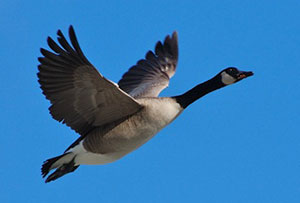By Louie Stout
 Waterfowlers Anticipate Banner YearIts going to be a great year for goose hunters.
Waterfowlers Anticipate Banner YearIts going to be a great year for goose hunters.
Thats the reports coming in from waterfowl managers monitoring goose production throughout the flyway and Indiana is no exception.
Those surveys include more than the birds hanging out at city parks that we already know about.
Indiana DNR waterfowl biologist Adam Phelps said banding projects here and elsewhere indicate gosling production last spring was as high or higher - as hes ever seen it.
Its going to be a great year for goose hunters, said Phelps. And this year, hunters can hunt geese into February.
The northern Indiana early goose season opened Saturday dates and runs to Sept. 11. Other seasons are Oct. 22 to Nov. 20, and Dec. 10 to Feb. 12.
Michigans south zone goose season opened Thursday and runs until Sept. 25, followed by Oct. 8-Dec. 4, Dec. 31-Jan. 1 and Jan. 21-Feb. 11.
It could be a banner year for ducks, too. Despite dry conditions in the Canadian Prairie last spring, mallard counts were at record levels. Local duck production is about normal, but Phelps said that anecdotal surveys of wood ducks indicate there will be an increase with them, too.
We had great nesting habitat and conditions in the spring throughout most of Indiana, he added. There should be a good number of young woodies around this fall.
While surveying U.S. Fish and Wildlife Service harvest numbers, Phelps was surprised to see nearly 60 percent of the Hoosier mallard harvest last year came from ducks raised in the Canadian Prairielands.
I was really surprised to see that, he said. We previously believe most of our birds came out of Michigan and Wisconsin.
Indianas north zone duck season will run Oct. 22 to Dec. 11, and Dec. 24 to Jan. 1. Southern Michigan duck hunters will hunt Oct. 8-Dec.4 and Dec. 31-Jan. 1.
How good the hunting season will be depends upon a lot of uncontrollable variables. Right now, most of Michiana has plenty of water to attract migrating geese and ducks, but that could change once duck season opens.
Most places have plenty of water but we also need a balance in temperatures for good waterfowl hunting in the fall, said Phelps. We want it to be cool but not frigid to where the water freezes up.
Hunters should see plenty of birds, but if an early cold snap freezes up our ponds and lakes prior to the duck season, those abundant birds will fly over us.